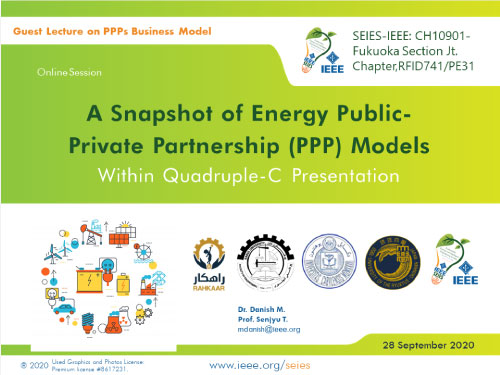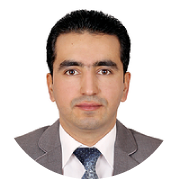A Snapshot of Energy Public-Private Partnership (PPP) Model Within Quadruple-C Presentation
Follow SEIES-IEEE update at: SEIES - IEEE Update

Engagement of public and private entities is crucial to align with the Goal-7 of SDGs 2030; and ensure modern energy access to the 3 billion people around the world, which are relying on the primary source of energy (wood, coal, charcoal or animal waste for cooking and heating) in the 21st century.
At the age of economic and dominant anarchy, not only private sectors also everybody should play role in global peace as well as saving the planet. In which, Public-Private Partnership (PPP) Models at small to large electrification projects can be used as an efficient tool to improve life quality, reduce poverty, provide quality education and health care, and balance economic cycle among public and private.
However, PPPs covers a broader theme, this webinar (Guest Lecture) highlights practical information that focuses on Energy Projects' PPP business models, structures, management models, and so on. Besides, the main technical and legal requirements are pointed out as well. The energy PPP model requirement and constrains are discussed within the quadruple-C as follows:
1- Conformity with national policies and regulations
2- Consensus on Win-Win business model, which is the prospect of future sustainable business
3- Comply with sustainability pillars
4- Comport with flexibility
Date and Time
Location
Hosts
Registration
-
 Add Event to Calendar
Add Event to Calendar
- 1 Senbaru, Nishihara
- Nishihara, Okinawa
- Japan 903-0213
- Building: Engineering 2nd Building
- Room Number: 517-2
- Contact Event Host
- Co-sponsored by University of the Ryukyus
- Survey: Fill out the survey
Speakers
 Dr. Danish M. of University of the Ryukyus
Dr. Danish M. of University of the Ryukyus
A Snapshot of Energy Public-Private Partnership (PPP) Model Within Quadruple-C Presentation
Biography:
Assistant Professor Mir Sayed Shah Danish (Dr. Eng., MBA, CEng., SMIEEE, MIET) has been an engineering and technology expert and an academician for several years. He demonstrates a simple, in-depth style of narration of concepts, turning concepts into measurable endeavors and exploring interdisciplinary coverage in a systematic manner. Apart from being a scientific scholar, he brings together multidisciplinary skills and expertise (energy, environment, business, and management) providing integrated solutions. He is the author of several academic and technical textbooks, guidebooks, training manuals, and other books in English and Dari (Persian) Languages. These publications have enabled him to link industry with academia, and he has achieved recognition with several awards and expressions of appreciation. Since 2004, Dr. Danish has been involved in multidisciplinary engineering and technology by leading several projects in those fields while continuing as an active scholar and educator. He is an assistant professor at the University of the Ryukyus, Japan; founder and chair of the IEEE-Sustainable Energy and Intelligent Engineering Society (SEIES-PES & FRID joint chapter, Fukuoka Chapter); founder and facilitator of the Ryukyus IET On-Campus Society, and Ryukyus ACM Chapter; Founder of the Rahkaar Research and Education Organization; and founder and president of the Research and Education Promotion Association (REPA). Dr. Danish has worked with national and international organizations and companies as an urban electric power planner, team leader, technical advisor, department head, educational manager, and director. He is a chartered engineer, UK (CEng.), senior member of IEEE, member of IET (MIET), and holds membership in many other academic societies. He received his bachelor’s degree in electrical and electronic engineering (B.Sc.) in 2009 from Kabul University, Afghanistan); two master’s degrees, one in energy and electrical engineering (M.Sc.) in 2015 from the University of the Ryukyus, Japan; the other in business administration (MBA) in 2016 from the National Institute of Business Management, India); and a doctorate in sustainable energy (Ph.D.) in 2018 from the University of the Ryukyus. He chaired and has been a committee member of several conferences and symposiums and has more than 50 publications. His main research interest is sustainable energy (policy, economics, market, environment, and management), smart cities and housing, storage systems, voltage stability, and related areas.
Email:
Address:1 Senbaru, , Nishihara, Okinawa, Japan, 903-0213
 Prof. Senjyu T. of University of the Ryukyus
Prof. Senjyu T. of University of the Ryukyus
A Snapshot of Energy Public-Private Partnership (PPP) Model Within Quadruple-C Presentation
Biography:
Professor Tomonobu Senjyu was born in Saga Prefecture, Japan, in 1963. He received the B.S. and M.S. degrees in electrical engineering from University of the Ryukyus, Nishihara, Japan, in 1986 and 1988, respectively; and the Ph.D. degree in electrical engineering from Nagoya University, Nagoya, Japan, in 1994. He is currently a Full Professor with the Department of Electrical and Electronics Engineering, University of the Ryukyus. He is an active scholar that runs and manage smoothly the industry by graduating theoretical and practical human resource. He has supervised tens of Ph.D. dissertations since 2004. His students are actively involved in the industry and academic fields throughout the world. He is leading the Power Energy System Control Laboratory (PESC) that demonstrates with recent technology and novel research outcomes. His laboratory publishes several peer-review journals each year. He has more than 500 peer-review publications in the high-ranking academic databases. His editorial contribution has been salient with many international journals. His nonstop support contributes to humanitarian and enhances academic affairs. Most of his students are from developing countries that pursue their studies under the Japan government scholarships. His research interests are in the areas of renewable energy, power system optimization and operation, power electronics, and advanced control of electrical machines.
Email:
Address:1 Senbaru, , Nishihara, Okinawa, Japan, 903-0213
Agenda
Contents:
1- What is the business model?
2- PPP Business Models
3- Need for PPPs
4- PPPs in terms of Quadruple-C
5- Energy (Power) Projects PPPs
6- PPPs Structure
7- PPPs Stakeholders
8- PPPs Partnership
9- PPPs Process
10-Energy (Power) Projects PPPs Practical Consideration
Project details: https://www.researchgate.net/project/SEIES-IEEE-wwwieeeorg-seies
Media
| ENERGY PUBLIC-PRIVATE PARTNERSHIPS (PPPs) | 47.12 KiB |

